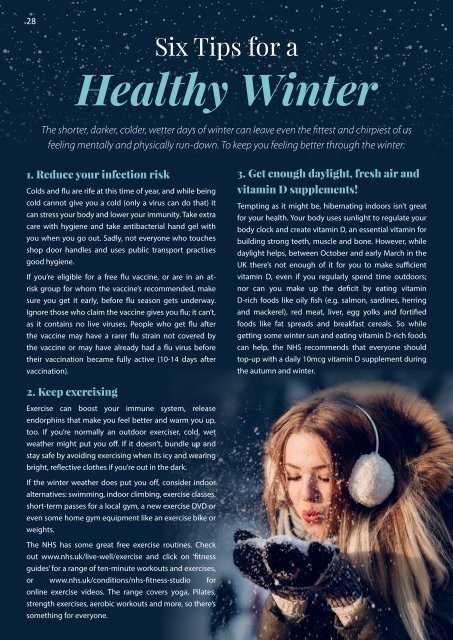Create successful ePaper yourself
Turn your PDF publications into a flip-book with our unique Google optimized e-Paper software.
28<br />
Six Tips for a<br />
Healthy Winter<br />
The shorter, darker, colder, wetter days of winter can leave even the fittest and chirpiest of us<br />
feeling mentally and physically run-down. To keep you feeling better through the winter:<br />
1. Reduce your infection risk<br />
Colds and flu are rife at this time of year, and while being<br />
cold cannot give you a cold (only a virus can do that) it<br />
can stress your body and lower your immunity. Take extra<br />
care with hygiene and take antibacterial hand gel with<br />
you when you go out. Sadly, not everyone who touches<br />
shop door handles and uses public transport practises<br />
good hygiene.<br />
If you’re eligible for a free flu vaccine, or are in an atrisk<br />
group for whom the vaccine’s recommended, make<br />
sure you get it early, before flu season gets underway.<br />
Ignore those who claim the vaccine gives you flu; it can’t,<br />
as it contains no live viruses. People who get flu after<br />
the vaccine may have a rarer flu strain not covered by<br />
the vaccine or may have already had a flu virus before<br />
their vaccination became fully active (10-14 days after<br />
vaccination).<br />
3. Get enough daylight, fresh air and<br />
vitamin D supplements!<br />
Tempting as it might be, hibernating indoors isn’t great<br />
for your health. Your body uses sunlight to regulate your<br />
body clock and create vitamin D, an essential vitamin for<br />
building strong teeth, muscle and bone. However, while<br />
daylight helps, between October and early March in the<br />
UK there’s not enough of it for you to make sufficient<br />
vitamin D, even if you regularly spend time outdoors;<br />
nor can you make up the deficit by eating vitamin<br />
D-rich foods like oily fish (e.g. salmon, sardines, herring<br />
and mackerel), red meat, liver, egg yolks and fortified<br />
foods like fat spreads and breakfast cereals. So while<br />
getting some winter sun and eating vitamin D-rich foods<br />
can help, the NHS recommends that everyone should<br />
top-up with a daily 10mcg vitamin D supplement during<br />
the autumn and winter.<br />
2. Keep exercising<br />
Exercise can boost your immune system, release<br />
endorphins that make you feel better and warm you up,<br />
too. If you’re normally an outdoor exerciser, cold, wet<br />
weather might put you off. If it doesn’t, bundle up and<br />
stay safe by avoiding exercising when its icy and wearing<br />
bright, reflective clothes if you’re out in the dark.<br />
If the winter weather does put you off, consider indoor<br />
alternatives: swimming, indoor climbing, exercise classes,<br />
short-term passes for a local gym, a new exercise DVD or<br />
even some home gym equipment like an exercise bike or<br />
weights.<br />
The NHS has some great free exercise routines. Check<br />
out www.nhs.uk/live-well/exercise and click on ‘fitness<br />
guides’ for a range of ten-minute workouts and exercises,<br />
or www.nhs.uk/conditions/nhs-fitness-studio for<br />
online exercise videos. The range covers yoga, Pilates,<br />
strength exercises, aerobic workouts and more, so there’s<br />
something for everyone.

















